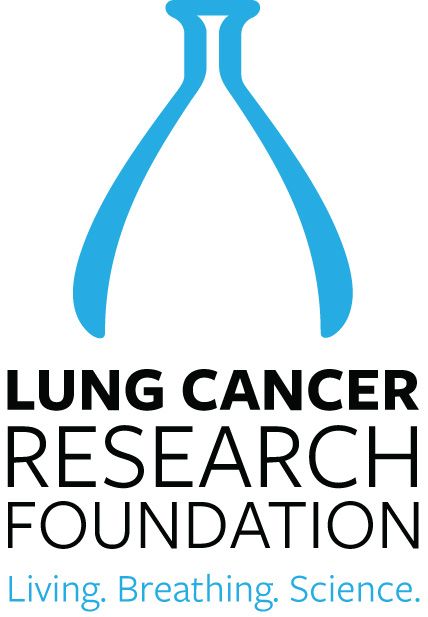
LCRF News: June 2022

On Tuesday, June 28, we will gather in Chicago for our first LCRF Together educational seminar: Lung Cancer Lowdown: What's New in Diagnosis and Treatment, with Jyoti Patel, MD.
Dr. Patel is Professor of Medicine at Northwestern University and Associate Vice Chair for Clinical Research in the university's Department of Medicine. She is also Medical Director of Thoracic Oncology and Assistant Director for Clinical Research for the Lurie Cancer Center. A leader in thoracic oncology, Dr. Patel focuses her efforts on the development and evaluation of novel molecular markers and therapeutics in patients battling non-small cell lung cancer.
If you are able to join us, we'd love to see you! If Chicago is not in the cards for you but you know someone who might benefit from this program, please spread the word.
Date: Tuesday, June 28
Time: 6-8 PM
Location:
The Ivy Hotel, Sky Terrace Rooftop
233 E Ontario St, Chicago, IL 60611
Complimentary parking:
iParkit, 614 N St Clair St, Chicago, IL 60611
#TogetherSeparately Monthly Livestreams & Facebook Group
LCRF hosts webinars to bring the lung cancer community together to discuss topics important to them.
#TogetherSeparately: ASCO Recap
June 29 @ 12:00 pm – 1:00 pm EDT
Dr. Isabel Preeshagul and Dr. Ibiayi Dagogo-Jack will join us for our Lung Cancer Community Talk on Wednesday, June 29 at 12:00 PM ET. This livestream is an opportunity to connect face-to-face with others who care about lung cancer and talk about challenges we’re facing, #TogetherSeparately. We are honored to have these experts join us to share exciting updates that come out of June’s ASCO Conference. They will help to summarize information that was presented at ASCO on the newest therapies and clinical trials for lung cancer.
Isabel Preeshagul, DO, MBS, Memorial Sloan Kettering Cancer Center
Register at:
LCRF updates its Comprehensive Biomarker Testing educational resource, now available for download:
You do not need to be a doctor to understand your tumor. Biomarker testing can help.
When your doctors suspected you had cancer, they took a small portion of your tumor tissue (a biopsy) to have it examined. A specialist, called a pathologist, looked at your tumor cells under the microscope and found out you had lung cancer. There are two main types of lung cancer–small cell lung cancer (SCLC) or non-small cell lung cancer (NSCLC). If you have NSCLC, the pathologist looks closely at the cancer cells for certain characteristics (features or qualities). Tumors with similar characteristics are referred to as subtypes. Adenocarcinoma (A-deh-noh-KAR-sih-NOH-muh) and squamous cell carcinoma (SKWAY-mus sel KAR-sih-NOH-muh) are the most common subtypes of NSCLC. Once your health care team knows the subtype of your cancer, treatment planning can begin. Read more at
Lung Cancer Mutation Consortium Sites Initiate LEADER Trial
First Sites Initiated for Trial Enrollment to Inform Neoadjuvant Targeted Therapy Options for Patients with Lung Cancer –
Additionally, a new “Trial in Progress” abstract was presented at the American Society of Clinical Oncology (ASCO) 2022 Annual Meeting on Monday, June 6 by Dr. Mark G. Kris, Attending Physician, Thoracic Oncology Service, Department of Medicine at Memorial Sloan Kettering Cancer Center and one of the investigators of the LEADER trial, and Boris Sepesi, M.D., F.A.C.S., Associate Professor, Department of Thoracic and Cardiovascular Surgery, Division of Surgery, The University of Texas MD Anderson Cancer Center, and Principal Investigator of the LEADER Trial. They will detail LEADER’s primary objective of determining the proportion of resectable NSCLC patients within the trial who possess actionable oncogenic drivers. Results from comprehensive genetic profile testing will inform the LEADER trial sites on their selection of neoadjuvant therapy and enrollment onto independent therapeutic trials with genomically matched neoadjuvant treatment, standard therapies, or other trials if no driver is detected. To access the abstract (Abstract TPS8596), go to
LCRF partners with patient advocacy groups on patient-focused research:
LCRF has launched a new funding mechanism to support research projects with a focus on characterizing, identifying, treating, or overcoming/preventing resistance to therapies in tumors harboring alterations in oncogenic drivers in NSCLC cells, tissues, mouse models, or patients. Work supported through this mechanism will addresses important mechanistic questions and developmental therapeutics across the care continuum and have the potential to increase survivorship. In 2022, in partnership with leading patient advocacy organizations, this grant mechanism will focus on three specific oncogenes: EGFR, MET and KRAS.
ALK Positive is partnering with the Lung Cancer Research Foundation (LCRF) to support ALK-positive non-small cell lung cancer research. Funded research projects are expected to have a direct impact on the outcomes of patients with advanced ALK-positive lung cancer, to ultimately transform care and improve outcomes for patients with ALK-positive NSCLC. Projects may be either translational studies that are aimed at impacting clinical decision-making within four years of award or aspects of clinical trials.
Read about the partnerships




